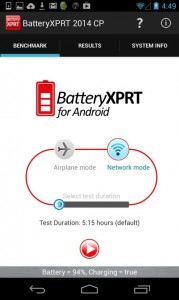Last week we released the BatteryXPRT 2014 for Android Community Preview 1 (CP1). As I said in last week’s blog, You wanted it? You got it!, you are free to publish results from this community preview.
We hope you’ll submit results to be published in the BatteryXPRT database. You’ll find the file containing your results in the Android\data\com.batteryxprt\BatteryXPRT\results directory on the SD card of your device. The results directory will contain a time-stamped directory for each run – for example, “2014Feb11142239.” You’ll find a file named Results.xml in the appropriate time-stamped directory. To submit a result, just e-mail the Results.xml file from your run to BenchmarkXPRTsupport@principledtechnologies.com.
The benchmark includes a user manual in the UI. In addition to the benchmark itself, you can also find installation instructions and a design overview in the member’s area.
We’ll make the source code for the community preview available in the next few days.
Given the diversity and changing nature of Android devices, we expect that you may run into some issues. As with any of our community previews, if you encounter any issues, please let us know so we can continue to improve the benchmark as we prepare it for release.
Community previews are only available to community members. If you are not a member, this a great time to join.
After you’ve downloaded CP1, let us know what you think by posting to the forum or e-mailing us at BenchmarkXPRTsupport@principledtechnologies.com.
Eric













